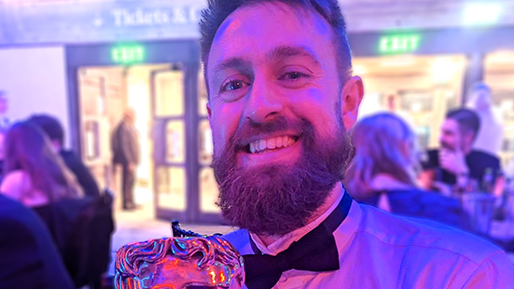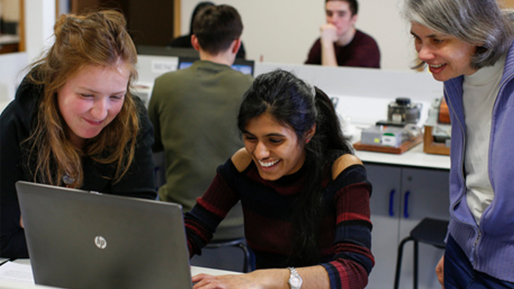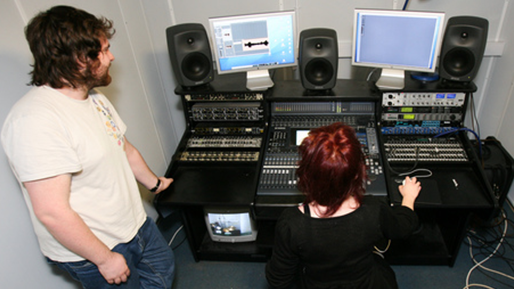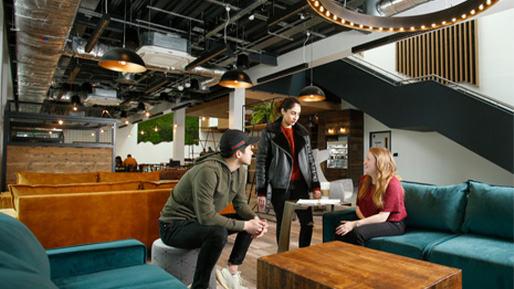
BSc (Hons) Songwriting and Artist Development
Tailor-made for aspiring contemporary songwriters, our Songwriting and Artist Development course will engage you in a nurturing environment where you will be able to hone your creative, technical and business skills.
-
Typical offer: 112—120
Entry requirements -
Fees: £9,535 per year (UK)
Full details -
UCAS code: W3T4
-
Course length: Various
Find out more -
Location:
- University of Hertfordshire, Hatfield
-
Institute code: H36
-
Work placement option
Find out more -
Study abroad option
Find out more
Course overview
Our BSc (Hons) Songwriting and Artist Development degree is one of five exciting courses in the Undergraduate Music Programme. To help you grow as an artist we have created the UKs only songwriting course offering a Bachelor of Science (BSc), due to its unique blend of creative, technical and business aspects, setting you up for a successful career as a songwriter.
The course will develop your songwriting skills to establish your own musical style whilst learning how to record, produce and master your products to ensure they are industry ready for marketing and promotion.
On this course you will collaborate extensively within the School of Creative Arts, connecting with peers in the fields of Composition, Music Production, Audio Engineering, as well as Live Sound and Lighting to reflect industry practice. The course provides many opportunities for students to collaborate and perform their music in state-of-the-art performance spaces, including our regular HertsLive event and our end of year SonicHerts festival.
Many of our university staff within the Music department are active within the music industry as producers, songwriters, composers, remixers, sound designers and engineers, bringing their experience and expertise into the teaching space.
This tailor-made course has been designed to include the core values required for a successful career as a songwriter. This will include writing engaging songs and making them sound great through contemporary production techniques. You will gain the knowledge to market and promote them effectively in a learning environment where you will develop personally and professionally.
So, if you are a talented songwriter, performer, producer or other music-creator with an appetite to expand your understanding of songwriting and its place within the wider creative industries, then this course is the ideal fit for you.
Why choose this course?
The Songwriting and Artist Development course is part of the School of Creative Arts, which is a dynamic academic community. The course is delivered by a diverse range of music specialists who have been specifically selected to teach core subjects in songwriting, composition, music production and marketing.
The school's delivery uses a blended learning environment to create engaging and nurturing teaching spaces. Students will learn through a variety of theoretical, technical and practical approaches, all of which are designed to reflect industry practice, therefore appropriately preparing students for the industry.
Teaching sessions take place in lecture halls, classrooms, computer labs, music studios, rehearsal spaces and venues. Students will have access to state-of-the-art spaces to develop their own practice, as well as access to a range of high-spec equipment and facilities during their studies.
The modules are designed to develop key professional attributes in creativity, technical knowledge, entrepreneurship and scholarly activity. Furthermore, modules empower students to choose their own path through a range of electives, whilst various projects enable students to co-write, collaborate and network with their peers across the school of music.
On this course you will benefit from strong industry links via the Music Academic Partnership (MAP), a groundbreaking initiative that unites educational institutions with members of the UK music industry. This collaboration aims to strengthen the connection between academia and the music sector, offering students unique opportunities to engage with industry professionals and enhance their career prospects within the dynamic world of music.
You'll be inspired further, by our highly qualified staff who are members of the ISM (Independent Society of Musicians) and the MU (Musicians' Union) and are certified trainers for key music software applications.
Situated close to London and with excellent access to industry, our vibrant creative community offers an inspiring and supportive environment in which to build your ideal career.
Listen to our students’ work
Your future career
This course will enhance your employability, equipping you with the expertise and skills for a range of multi-sector positions and disciplines. Career opportunities are varied and can include the following:
- Songwriter
- Artist
- Performer
- Composer
- Music Producer
- Continued Higher Education (Masters or Doctoral degrees)
- Teacher (PGCE)
Our graduates have gone on to work for a range of organisations including, Universal Music, EMI, Sony Music, and the BBC. Recent graduates have gone on to work with Moonbug Entertainment and VIP Music Records.
We will get you ready to enter the job market with a portfolio that will stand out from the crowd. This course is specifically designed to ensure you leave with the skills and knowledge to succeed in your career.
You will benefit from CV-boosting opportunities, career advice, and optional modules that further enhance your employability.
See what recent graduates are up to

Michael Leaning
Sound Designer at Sweet Justice Sound
New paths
Michael developed many skills during his time at Herts, which he believes helped him in his career as a sound designer. He says, 'My undergraduate degree in Music Technology introduced me to sound design for the moving image, something I hadn't thought about when applying for the course. I had initially been focused on music. There was something about putting sound to visuals that excited me and I've been doing it ever since.'
Inspirational opportunities
Michael took full advantage of all the opportunities offered to him during his studies and explains how they really helped him to progress in his career. 'Having the opportunity to work with animation students was one of the best experiences. I also enjoyed having the opportunity to work in a professional studio setting, and take my first steps into sound design on high-end equipment and surround sound. Having the opportunity to learn about so many different aspects of sound and collaborating with different creative disciplines definitely led me on the path I’m walking today.'
Winning a BAFTA and his aspirations for the future
In 2023, Michael won an Audio Achievement BAFTA Game Award as part of a team who worked on the hit video game God of War Ragnarök. Michael said working with his company, Sweet Justice Sound, on the game was a 'career highlight'.
Michael is looking forward to what the future has in store for him and says, 'I’ve been lucky enough to work on some of the biggest gaming franchises during my career. I’m looking forward to continuing to work on amazing games and honing my skills over a long and varied career.'

Matthew Mainprize
Audio Designer at Frontier Developments
University experience and opportunities
Matthew thoroughly enjoyed his course at the University of Hertfordshire, as it guided him towards his current career path, which he really loves. He says, 'My studies allowed me to develop my interests and skills and provided an environment to learn and apply myself to a specific task over extended periods of time. The teacher support and engagement were very helpful.'
Matthew currently works as an Audio Designer on Jurassic World Evolution and talks about how his studies were extremely useful in helping him decide his profession and subsequently securing his current role.
'I took a while to decide what I wanted to do with my life prior to university, and when I worked out what that was, Hertfordshire was the one place that offered a course that was exactly what I was looking for. It provided me with the option to do a placement year, and this enabled me to get an internship at a Microsoft Games Studio. Without going to university, I would not have had this opportunity, nor the skill-set to get the position.'
Industry connections
Matthew encourages prospective students to make the most of their time at Herts. He suggests, 'Have the best portfolio you can and keep it refreshed where possible. Make best use of your connections from university and collaborate on projects with them. I like to keep up to date with what my other friends are doing with their own personal projects and careers.'
Matthew took advantage of all the opportunities at Herts, both inside and outside of his studies. He advises other students to do the same and adds, 'Always keep an eye out for any opportunities that may appear, and keep your options and goals open at the start. I remember having a number of projects I worked on, featured in the Animation feature film day!'
Aspirations for the future
Still looking to improve himself and progress in his career, Matthew wishes to develop his skills as a sound designer. 'My plans are to continue to learn and improve, whilst working at Frontier. I want to increase my output, value and contribution to the games we work on so that they can be the best that they can be.'
What you'll study
Your development as a subject specialist and broadly knowledgeable professional relies on our specifically designed course which develops all key areas of study in your field, which are regularly reviewed to remain current and industry relevant.
Your songwriting pathway will be underpinned by a songwriting module which introduces the principles of songwriting skills and techniques, before developing them to intermediate and advanced levels, culminating in a portfolio of songwriting work ready for release – whilst encouraging students to always remain true to their artistic voice.
The BSc (Bachelor of Science) outcome is reflective of the sharp emphasis placed on technology, with a module tailored to develop technical skills from the introduction of DAWs, effects, mixing and recording to advanced techniques such as mastering, programming and spatial audio.
Additionally, there are modules specifically designed to broaden your understanding of the music business, emerging technologies, the future of the industry and your placement within it, with particular focus on artist development and entrepreneurship.
Other electives will include singing and performance, international music styles, musicianship and music theory, scoring and orchestration, sound-art, and Ableton Live among many other diverse opportunities to enhance your learning.
You will leave the course with up to date theoretical, practical, and technical knowledge along with a portfolio of work that meets industry standards, required for global employment across a wide range of career options.
Optional sandwich year
Graduate with invaluable work experience alongside your degree and stand out from the crowd. This course offers you the opportunity to enhance your study and CV with a year in industry, typically between your second and third years of study. It’s a chance to explore career possibilities, make valuable contacts and gain sought after professional skills.
Research shows that over 70% of employers prefer students with work experience, which is why we believe work placements are career gold. Our Careers and Employment service are here to support you explore your options and make valuable contacts for your future career.
You’ll pay no tuition fee for this year and won’t need to worry about the details of your placement until your second year of study.
Study Abroad offers the opportunity for an amazing experience, which will help make you stand out from the crowd. With more and more companies working internationally, experience of living in another country can make a great impression on future employers.
This course offers you the opportunity to enhance your study and CV with a sandwich year abroad. The University has partnerships with over 150 universities around the world, including the USA, Canada, Asia, Africa, Australia, South America and closer to home in Europe.
If you study abroad between your second and third year of study, you’ll pay no tuition fee to the partner university and no tuition fee to us either. We’ll ask you to make your decision in your second year, so there is plenty of time to think about it.
Graduate with invaluable work experience alongside your degree and stand out from the crowd. This course offers you the opportunity to enhance your study and CV with a year in industry, typically between your second and third years of study. It’s a chance to explore career possibilities, make valuable contacts and gain sought after professional skills.
Research shows that over 70% of employers prefer students with work experience, which is why we believe work placements are career gold. Our Careers and Employment service are here to support you explore your options and make valuable contacts for your future career.
You’ll pay no tuition fee for this year and won’t need to worry about the details of your placement until your second year of study.
Find out more about work placementsStudy Abroad offers the opportunity for an amazing experience, which will help make you stand out from the crowd. With more and more companies working internationally, experience of living in another country can make a great impression on future employers.
This course offers you the opportunity to enhance your study and CV with a sandwich year abroad. The University has partnerships with over 150 universities around the world, including the USA, Canada, Asia, Africa, Australia, South America and closer to home in Europe.
If you study abroad between your second and third year of study, you’ll pay no tuition fee to the partner university and no tuition fee to us either. We’ll ask you to make your decision in your second year, so there is plenty of time to think about it.
Find out more about study abroad optionsWhere you'll study
The undergraduate music programme is delivered from the heart of the School of Creative Arts situated on the College Lane Campus – primarily within the attractive Film, Music and Media Building. You will have access to a stunning array of well-maintained resources and facilities aligned to industry standards, including recording studios, performance spaces, critical listening spaces, high-spec computing labs and a loan store full of free-to-access kit.
Take a further look at our facilities.
Check out our student blogs
How we support our students
At the University of Hertfordshire, we want to make sure your time studying with us is as stress-free and rewarding as possible.
We offer a range of support services, from childcare to counselling, ensuring that you make the most of your time at Herts and can focus on studying, having fun, and have the support you need.

Student Blogs
Jake F - My week at a Glance
My Week at a glance
Week at a glance – Hi! I’m Jake, I recently completed the final projects of my degree in Music and Sound Design Technology and in this blog, I will give you an overview of a typical week in my third and final year at Herts. My average third-year week would usually include two days of lectures, one or two shifts at work and the rest of the week spent working on assignments and socialising with friends.
I only had two days a week of lectures in my final year which meant I could be very flexible with how I spent my time. I would always attend all my lectures and typically spend another two to three hours working on assignments on these days during the evenings. The rest of the week I would usually aim to work six hours, but this varied as I had other commitments. It is not necessary to work six hours per day but as I am aiming for a first-class grade, this was enough for me to learn and practise everything I needed too without overworking myself.
During my final year, I worked at the Forum at UH (University of Hertfordshire) as a live sound and lighting technician, something I really enjoyed doing as it was the first time working in a job related to my sound engineering course. Usually, I would work two shifts a week, Wednesday night and Friday evening which worked out at around 12 – 15 hours a week, sometimes it was more and sometimes less. The fact the shifts were in the evening and at night was good as it allowed me to focus on my assignments during the day, but club nights would see me often working till 04:00 or later which did leave me tired the next day but this was part of the job and it was a great experience overall.
It was especially important that I put aside time for myself to relax and socialize with friends and to take time out of all the work I was doing. I and a friend from my course got into a routine of playing table tennis each night to get some light exercise and to take a break from the assignments. In the final year can be stressful sometimes, so it is particularly important to look after yourself by exercising, eating healthily (and enough!) and spending time with friends or relaxing by yourself
I think being at Uni is about finding the right balance of work and fun that works for you, it is a wonderful way to practise self-discipline and time management and you will learn a lot about yourself.
Thanks for reading!

Student Blogs
Jake F - Guide to the facilities
Subject Facilities
As a sound engineering student, you have access to everything you need to prepare you for working in the industry. It is a very practical subject so having the right equipment, software, and hardware, is vital for getting the hands-on experience you need. Most of my work was done in the FMM, Film Music & Media building which has computer labs with all the latest programs, surround sound ‘satellite’ rooms, an acoustically treated room for film sound, and many other musical spaces and practise rooms. You also have access to the Art and Design buildings where you will find fully kitted out music studios with performing and recording rooms with the latest mixing desks and computers, a Foley studio which I used a lot for films, and the loan store. The loan store allows you to borrow equipment such as microphones, musical instruments and other equipment like video cameras and accessories.
Having access to these spaces was vital as part of my learning experience as there is no substitute for hands-on learning but Herts gave me everything, I needed to ensure I am prepared to start work or go onto further education.
I also had some lectures in the Forum where I learned about live sound and acoustics. I had the privilege to work at the Forum which gave me an even more extensive knowledge of live sound setups. The facilities at the Forum are incredible and working with such a high standard of equipment was always exciting. There are two music rooms in the Forum, the main auditorium which is a large capacity club room with a full lighting rig and a custom sound setup. There is also the attic which is a smaller venue which hosts Herts Jam which is a student-run music event held three times a year. The Forum has seen some big artists and bands play there, such as Enter Shikari and even the music video for Ed Sheeran’s Lego House was filmed there.
As well as the specialist spaces, you have everything you would expect as a student like lecture halls and access to the library on campus where you can borrow books and magazines and use computers and printers. You also have access to the online library to check if they have a book and if it is available.
UH (University of Hertfordshire) exceeded my expectations of professional equipment and facilities and I would highly recommend anyone looking to study music technology or sound engineering to consider Herts. Despite graduating during the Covid-19 outbreak and it being a strange time, I feel prepared for my future, whenever and wherever that may be!

Student Blogs
Jake F- Why I chose Herts
Why I chose Herts
When I attended the open day and had the subject talk, Herts was able to relay confidence in their teaching abilities and the course itself, that other universities I visited were not able to do. They really sounded like they knew their stuff, and this was backed up by statistics in student satisfaction and almost 100% of students being in further education or work within six months of graduating. The course itself also sounded more suited to me as it was a mix of creative and technical teaching compared to some universities being much more technical and less practical and creative.
The facilities were impressive, and I could picture myself working in the labs and studios as we were shown around. I had never accessed any sound equipment before I had gone to university so seeing these facilities up close was a very motivating experience.
The course lived up to my expectations and I really enjoyed being taught there. The staff were very friendly and incredibly knowledgeable in their respective fields of work and I can’t see how it could have been improved.
I also felt that I could imagine myself at Herts much more than the other universities I visited. This may have been due to it being a campus university where most of the University is based on one campus. This made it seem like a true community and a busy, bustling place full of young people like me. The campus itself was very appealing due to the modern accommodation facilities and other stylish buildings and spaces. The College Lane Campus has a very homely and connected feel due to the Oval building which sits surrounded by accommodation blocks. It, therefore, gave the impression of being very social which was appealing as I was overly excited about meeting many friends during my time there.
Another reason I chose Herts is its proximity to London. I love cities, especially London, and being so close was massively appealing to me. It was only 20 minutes on the train, and I took opportunities to travel there when I could, meeting family and friends and working in the city centre on some occasions. It also meant travelling home was easy as I could get a direct train to Manchester from London.
Going to a university far from my home was not an issue for me, if anything, it was more appealing as I like to experience living in different areas. It can be daunting moving far from your family, but you will meet so many people very quickly and soon, the university will feel like your home.
Entry requirements
The University of Hertfordshire is committed to welcoming students with a wide range of qualifications and levels of experience. The entry requirements listed on the course pages provide a guide to the minimum level of qualifications needed to study each course. However, we have a flexible approach to admissions and each application will be considered on an individual basis.
| Typical offer (UCAS points) | 112—120 |
|---|---|
| Typical A Level offer | BBC—BBB |
| Typical IB offer | 112—120 points from a minimum of 2 HL subjects at H4 or above (with the remaining points to come from a combination of HL, SL and Core) |
| Typical BTEC offer | DMM—DDM |
| Accepted T Levels | Design Survey and Planning for Construction; Design Production, Design and Development; Education and Childcare; Healthcare Science; Health; Science; Digital Support Services; Digital Business Services; Onsite Construction; Building Services Engineering for Construction; Accounting; Design and Development for Engineering and Manufacturing; Engineering, Manufacturing, Processing and Control; Finance; Maintenance, Installation and Repair for Engineering and Manufacturing; Management and Administration; Agriculture, Land Management and Production; Legal Services |
| Access courses | Diploma with 45 level 3 credits at merit |
| Additional information | We accept UCAS tariff points for music exam qualification such as ABRSM level 3 exams (grades 6-8). Please check the Tariff Calculator on the UCAS website for full details. Find out more about our standard and contextual Undergraduate Entry Requirements. |
| English language | All students from non-majority English speaking countries require proof of English language proficiency, equivalent to an overall IELTS score of 6.0 with a minimum of 5.5 in each band. If you do not have the required IELTS or equivalent for direct entry on to your degree programme, our Pre-sessional English and International Foundation courses can help you to achieve this level. |
|---|---|
| Additional information | Find out more about International Entry Requirements. |
Ready to apply?
UK and EU applicants with pre-settled/settled status in the UK
| Start date | Study type | Apply |
|---|---|---|
| September 2025 | Full time | Apply via UCAS |
| Full time with placement year | Apply via UCAS | |
| Full time with study abroad year | Apply via UCAS | |
| Part time | Apply with Herts |
International and EU applicants without pre-settled status in the UK
Fees and funding
At Herts, we’re dedicated to providing world-class teaching supported by industry-level facilities and incredible social spaces. We believe cost shouldn’t be a barrier to higher education, and we strive to keep both our standard and additional costs as low as possible.
| Study type | Fees | |
|---|---|---|
| UK students | Full time | £9,535 for the 2025/2026 academic year |
| Part time | £1,190 per 15 credits for the 2025/2026 academic year | |
| EU students | Full time | £15,965 for the 2025/2026 academic year |
| Part time | £1,995 per 15 credits for the 2025/2026 academic year | |
| International students | Full time | £15,965 for the 2025/2026 academic year |
| Part time | £1,995 per 15 credits for the 2025/2026 academic year |
Tuition fees are charged annually. The fees quoted above are for the specified year(s) only. Fees may be higher in future years, for both new and continuing students. Please see the University’s Fees and Finance Policy (and in particular the section headed “When tuition fees change”), for further information about when and by how much the University may increase its fees for future years.
| Scholarships, grants and bursaries | Depending on your circumstances, you may be eligible for a non-repayable scholarship, grant or bursary to support your studies. |
|---|---|
| Disabled Students' Allowance | The Disabled Students’ Allowance can cover any study-related costs you have because of a mental health problem, long term illness or any other disability. |
| Student loans | Find out about securing a student loan, from how much you could be eligible for to when you need to start making repayments. |
| Accommodation costs | We offer a great choice of student accommodation, on campus or nearby in the local area, to suit every student budget. |
| Additional course fees | Read more about additional fees in the course fact sheet. |
More about the course
| Course fact sheets | |
|---|---|
| BSc (Hons) Songwriting and Artist Development | Download PDF |
| Programme specifications | |
|---|---|
| BSc (Hons) Songwriting and Artist Development | Download PDF |
| Additional information | |
|---|---|
|
Applications open to international and EU students |
Yes |
Course length |
Full Time, 3 YearsPart Time, 6 YearsSandwich, 4 Years |


